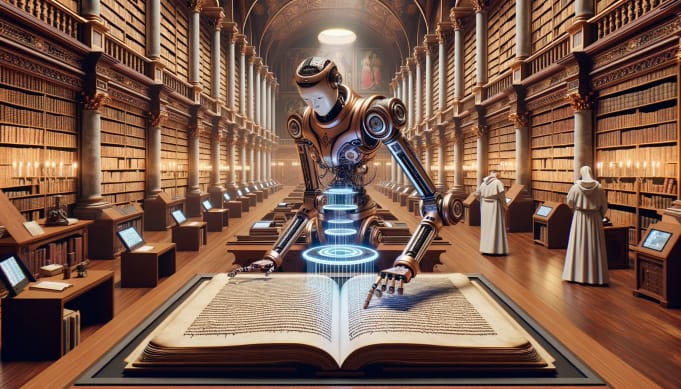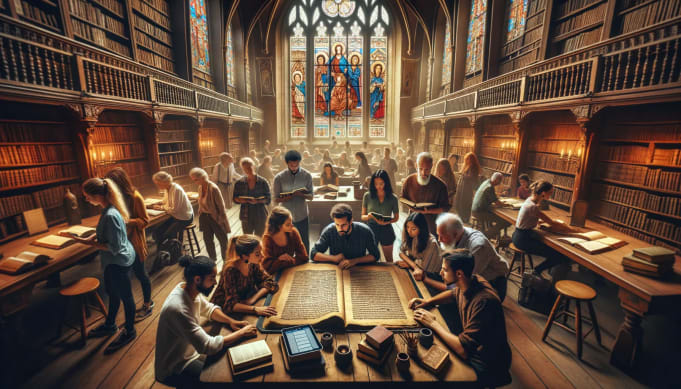The Role of AI in Preserving and Studying Ancient Biblical Manuscripts
I'm going to say something controversial: we need AI to protect our Biblical heritage, and if we don't act fast, we could lose it forever. Don't believe me? Consider this: a staggering 25 percent of ancient manuscripts are at risk of irreparable decay (The Jerusalem Post). Technology changes that.
In this blog post, we will dive deep into how Artificial Intelligence (AI) can be a critical tool in preserving and studying ancient Biblical manuscripts. This includes:
- The urgency of preservation.
- How AI can assist in digital preservation.
- Advanced techniques for studying manuscripts using AI.
- Real-world applications and success stories.
- Challenges and ethical considerations.
The Urgency of Preservation: Why It Matters
As Christians, we hold the Bible sacred. But what if we could lose portions of it? The steady decay of ancient manuscripts poses a dire threat. According to The British Library, many manuscripts are deteriorating faster than can be archived.
Imagine this: the Dead Sea Scrolls crumbling before your eyes. It's a terrifying thought. But it's happening, and our response must be swift and effective.
"The grass withers, the flower fades, but the word of our God stands forever." - Isaiah 40:8 (ESV)
The State of Ancient Manuscripts
- Paper and Parchment: Over time, these deteriorate.
- Ink Fading: Ancient ink can fade, chiefly with exposure to light and air.
- Environmental Factors: Humidity, temperature, and pollution all contribute to the decay.

Growing Global Awareness
Thankfully, global awareness is increasing, and funds are being allocated to preserve these treasures. Still, we're not moving fast enough. AI can help us catch up.
The Biblical Mandate for Preservation
Scripture itself places a high value on the preservation of God's Word. In Deuteronomy 4:2 (NIV), it is written, "Do not add to what I command you and do not subtract from it, but keep the commands of the Lord your God that I give you." This mandate underscores the importance of maintaining the integrity of the Biblical text.
How AI Can Assist in Digital Preservation
AI and the Image of God (Study Guide)
Packed with Bible verses and thought-provoking questions, this study guide explores AI's effect on areas like creativity, morality, work, privacy, and the church itself.
Download NowArtificial Intelligence can play a pivotal role in digital preservation. Through advanced pattern recognition and machine learning, AI can catalog and analyze manuscripts faster and more accurately than any human.
High-Resolution Imaging
High-resolution imaging is one of the first steps in preserving manuscripts. Here's how AI can enhance this process:
- Digital Cameras: Capture manuscripts in ultra-high resolution.
- Spectral Imaging: Reveals invisible layers of text.
- AI-Enhanced Reconstruction: Rebuilds damaged sections digitally.
Example: The Codex Sinaiticus project used AI to stitch together and enhance fragmented images of one of the oldest Bibles (Codex Sinaiticus Project).

"Heaven and earth will pass away, but my words will never pass away." - Matthew 24:35 (NIV)
Data Storage and Retrieval
Once digitized, these high-resolution images need to be stored in a manner that ensures their longevity and accessibility. AI can help by:
- Cataloging Metadata: Automatically tagging images with relevant metadata.
- Efficient Retrieval Systems: Using machine learning to improve search algorithms for easier access.
Machine Learning for Damage Assessment
AI can also assess the current condition of manuscripts by identifying areas of damage that require immediate attention. For instance, machine learning models can be trained to recognize patterns of wear and tear, such as:
- Ink erosion
- Fungal growth
- Physical tears and folds
Automated Transcription
Another critical function that AI serves is automated transcription. This involves converting the text from images into machine-readable formats, allowing for easier analysis and study.

Benefits:
- Speed: Transcriptions completed in a fraction of the time it would take a human.
- Accuracy: Reduces human error in manual transcription.
- Scalability: Capable of handling large archives of text.
Advanced Techniques for Studying Manuscripts Using AI
Artificial Intelligence can translate, analyze, and interpret ancient texts, providing new insights and revelations.
Textual Analysis
AI can seek the semantic layers of Biblical texts to uncover deeper meanings and connections:
- Natural Language Processing (NLP): Understands and translates ancient languages.
- Machine Learning Models: Detects patterns and relationships within the text.
Image Analysis
Transform Your Ministry with AI (Save 10+ Hours Weekly!)
Effortlessly create stunning graphics, videos & audio, reach more people with translation, and streamline tasks. Elevate your church's impact – no tech expertise needed!
Download Now- Optical Character Recognition (OCR): Converts images of text into machine-readable text.
- Image Restoration: AI can digitally repair damaged areas.
Illustration: An AI model trained on ancient Greek texts uncovered previously unnoticed textual consistencies in the Dead Sea Scrolls (Journal of Biblical Literature).

Semantic Analysis
Semantic analysis involves understanding the context and meaning behind words and phrases. AI can assist by:
- Identifying Synonyms and Antonyms: Providing a fuller understanding of the text.
- Cross-Referencing Texts: Finding connections between different parts of the Bible.
Linguistic Flow Analysis
Linguistic flow analysis examines how the language progresses throughout a text. This can highlight the authors' intentional shifts in tone or focus. Questions AI can help answer include:
- Were there multiple authors?
- Are there sudden thematic shifts?
Emotional Sentiment Analysis
AI can even be used to gauge the emotional tone of a text:
- Positive vs. Negative Sentiment: Helps to understand the emotional impact.
- Comparative Studies: Comparing emotional tones between books, such as Psalms and Lamentations.
Real-World Applications and Success Stories
AI isn't just theoretical; it's practically helping preserve Biblical artifacts as we speak.
The Dead Sea Scrolls
Israel Antiquities Authority employed AI to digitize the Dead Sea Scrolls, making them accessible worldwide and uncovering new insights (Dead Sea Scrolls Project).
St. Catherine's Monastery
At St. Catherine's Monastery in Sinai, AI has helped catalog thousands of manuscripts, preserving both text and the rich historical detail (Library of Congress).
Vatican Apostolic Library
The Vatican Apostolic Library has started implementing AI technologies to digitize their massive collection of ancient manuscripts, making them available for scholars worldwide.
"Seek and you will find; knock and the door will be opened to you." - Matthew 7:7 (NIV)

Challenges and Ethical Considerations
Using AI to preserve God’s Word also comes with ethical dilemmas. How do we ensure authenticity and avoid misuse?
Authentication Challenges
- Bias in AI Models: An AI model can inherit human biases.
- Data Integrity: Ensuring the data feeding the AI is accurate.
Ethical Questions
- Human Oversight: AI should assist, not replace, human scholars.
- Transparency: The algorithms and data should remain transparent.
"My people are destroyed for lack of knowledge." - Hosea 4:6 (ESV)

Addressing the Issues
- Human-AI Collaboration: Combining human expertise with AI capabilities.
- Open-Source Initiatives: Encourage transparency and collaboration.
Mitigating Risks
- Regular Audits: Continuously verifying the accuracy and reliability of AI algorithms.
- Ethical Reviews: Implementing ethical reviews before deploying AI models.
Community Involvement
AI and the Image of God (Study Guide)
Packed with Bible verses and thought-provoking questions, this study guide explores AI's effect on areas like creativity, morality, work, privacy, and the church itself.
Download NowOne cannot ignore the role of the Christian community in this initiative. We, as a collective body of Christ, can actively participate in these preservation efforts.
Church and Community Efforts
Local churches and Christian organizations can support these initiatives by:
- Funding Projects: Allocating part of their budget to support AI research in Biblical preservation.
- Volunteer Programs: Engaging congregants in data annotation and other supportive roles.
Personal Involvement
Individual believers can contribute by:
- Educational Initiatives: Participating in or organizing seminars and workshops on the topic.
- Online Evangelism: Sharing information about these projects on social media to raise awareness.
"For where two or three gather in my name, there am I with them." - Matthew 18:20 (NIV)

Conclusion
Artificial Intelligence presents a God-given opportunity to preserve and study the ancient Biblical manuscripts that form the bedrock of our faith. While challenges and ethical issues remain, the benefits far outweigh the risks. By leveraging AI, we can ensure that the Word of God continues to enlighten and guide generations to come.
"Thy word is a lamp unto my feet, and a light unto my path." - Psalm 119:105 (KJV)

Related Resources
Transform Your Ministry with AI (Save 10+ Hours Weekly!)
Effortlessly create stunning graphics, videos & audio, reach more people with translation, and streamline tasks. Elevate your church's impact – no tech expertise needed!
Download NowCheck out these related articles:
- Using AI for Advanced Hebrew and Greek Language Learning
- AI-Powered Tools for Biblical Text Analysis
Frequently Asked Questions (FAQs)
How does AI help in preserving ancient manuscripts?
AI assists in digital preservation by enabling high-resolution imaging, OCR, and image restoration, helping to maintain and study texts that might otherwise decay.
Is AI replacing Biblical scholars?
No, AI is not replacing scholars; it is a tool to aid them. Human oversight is crucial to ensure accuracy and maintain ethical standards.
What are some ethical concerns with using AI in Biblical studies?
Ethical concerns include biases in AI models, ensuring data integrity, and maintaining transparency in AI processes and outputs.
How can churches and individuals get involved in these efforts?
Churches and individuals can get involved by supporting digital preservation projects, participating in collaborative efforts, and staying informed about advancements in AI and Biblical studies.
Remember, the future of our ancient scripts lies in the balance. Let's combine faith and technology to safeguard God’s Word for future generations. ✝️📜


